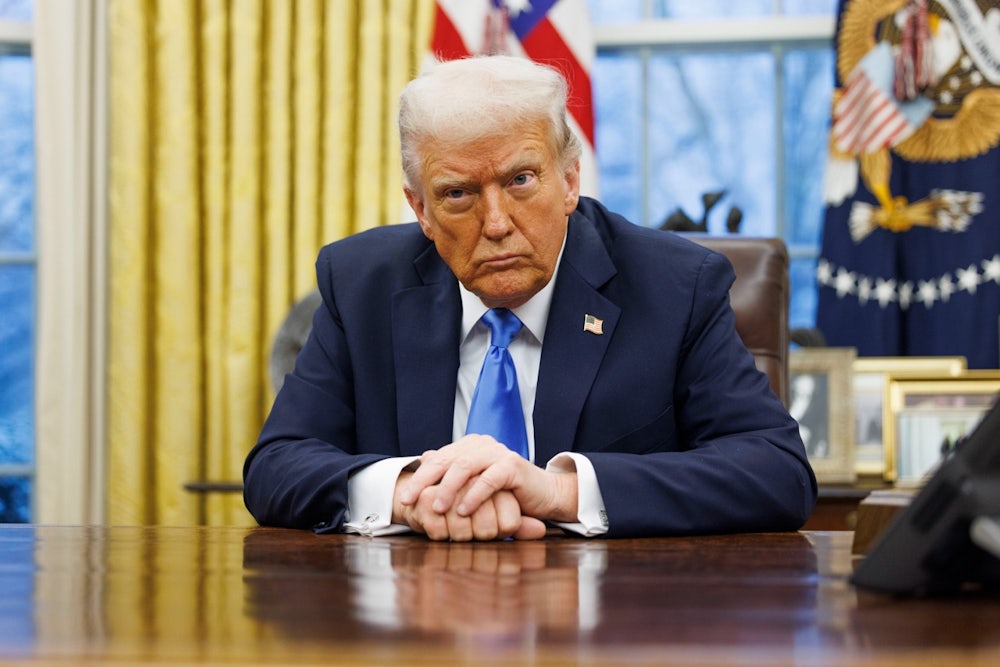Vice President JD Vance’s incendiary suggestions about executive branch noncompliance with judicial orders should, for now, be taken as a feint—but a feint in the direction of a steep constitutional cliff that leads to constitutional desolation.
With words that triggered various degrees of concern and panic throughout the legal community, Vance wrote on X Sunday that “judges aren’t allowed to control the executive’s legitimate power.” This came after another Sunday post in which Vance stated that judges can’t “tell a general how to conduct a military operation,” or “command the attorney general in how to use her discretion as a prosecutor.”
Vance was being cagey, if not downright deceptive. The all-important wiggle-word in both his posts is “legitimate.” That enormous hedge permits him to claim that he was merely explaining that there are certain discrete areas of executive power not generally considered subject to judicial scrutiny. That proposition is uncontroversial.
The caginess consisted in the context of Vance’s post. It came in response to an order from Manhattan Federal District Judge Paul Engelmayer, who temporarily enjoined the Department of Government Efficiency from accessing the Treasury Department’s payment and data systems, which contain personal data for millions of Americans. Engelmayer further ordered that anyone who had downloaded material from the systems delete all copies.
Engelmayer’s action came in a lawsuit brought by 19 Democratic attorneys general, alleging a series of constitutional and statutory violations in letting DOGE ransack the sophisticated and ultrasensitive Treasury payment systems. The judge found that the states were likely to succeed on the merits of their legal claims, and that they would face irreparable harm if DOGE were permitted to access the systems.
In the context of federal courts’ everyday work, all this is routine. Parties who can be harmed by controversial assertions of executive power commonly bring suit in federal court, and ask for a temporary injunction, pending a full adjudication of their claims. More than 40 lawsuits already have been filed alleging various legal violations by the young administration. And where the harms are serious and hard to reverse, and the legal claims strong, federal courts grant the temporary request and proceed to a full determination on the merits. It’s the American way.
Federal courts granting relief also became par for the course for the various unconstitutional power grabs by Donald Trump in the last three weeks. No fewer than six district courts and counting have ordered the administration to put a halt on its plans until the plans’ lawfulness could be determined. In one of them, challenging the Office of Management and Budget spending freeze, the district court already has taken the administration to task for failing to comply with its “clear and unambiguous” injunction. Elsewhere, the executive order ending birthright citizenship—frozen. Transferring transgender female prisoners to male-only prisons—frozen. The buyout of federal workers—frozen. The destruction of USAID—frozen. And, as noted, DOGE’s access to the Treasury payments system—frozen.
And each of those decisions required a finding by a federal district court judge that the challengers (a) were likely to prevail on their legal claims and (b) were being harmed as a result of the conduct.
Engelmayer is highly respected for his fairness and intellectual horsepower. I can add my own endorsement of his strengths as a judge, having known him since we clerked together at the Supreme Court some 35 years ago.
So in firing a shot across the bow in clear response to Engelmayer’s injunction, Vance was implying much more than just the undisputed discretion presidents hold in military matters or prosecutorial decisions. Rather, Vance was aiming at the run of cases like the one before Engelmayer in which courts enjoin lawless executive action. His insinuation that those sorts of orders are illegitimate looks to be softening the road for a future standoff with the judicial branch.
That sort of constitutional hubris would be of a piece with the current stance of the administration vis-à-vis Congress, whose binding commands it is simply flouting. And of course, the Republican Congress’s repeated rollovers in response are a large reason why we are already at the threshold, if not firmly in the territory, of constitutional crisis.
But if the Trump administration makes good on its hints at ignoring the mandates of the courts, we would be in the epicenter of that territory. Indeed, while it’s a longer story, Trump and his acolytes, including in particular Elon Musk, are flirting with disregard of judicial commands by a president for the first time in the country’s history.
Andrew Jackson, historical legends aside, didn’t do it: He probably never said, “John Marshall has made his decision; now let him enforce it,” and in any event, the case in question was against the state of Georgia, and the Supreme Court never ordered him to do anything. Abraham Lincoln didn’t do it: He exercised extreme emergency powers that had been understood to inhere in the presidency since the beginning of the republic, rooted in the Founders’ veneration of John Locke. Dwight Eisenhower, Richard Nixon, and Al Gore all didn’t do it: They did the exact opposite—respecting a higher court opinion with which they disagreed. In Nixon’s case, it cost him the presidency; in Gore’s, it ended his presidential hopes.
Eisenhower, whose support for civil rights was considered tepid, nevertheless did not hesitate to execute the Supreme Court’s command to integrate Arkansas schools, famously sending in federal troops to overcome local political resistance. He explained to the nation that “the very basis of our individual rights and freedoms rests upon the certainty that the president and the executive branch of government will support and ensure the carrying out of the decisions of the federal courts, even when necessary with all the means at the president’s command.”
Should Trump combine his disregard for Congress with an equal contempt for the courts, simply ignoring their commands, it would be the demise of constitutional rule in the very terms that the Framers warned us about. As Madison put it in The Federalist, Number 47, “The accumulation of all powers, legislative, executive, and judiciary, in the same hands, whether of one, a few, or many ... may justly be pronounced the very definition of tyranny.”
It also would be a stinging rebuke to Chief Justice Roberts, whose 2024 year-end report featured a paean to judicial independence in The Federalist Papers; he called it one of the “crown jewels of our system of government.” And, in a clear invocation of Trumpian forces, if not of Trump himself, he went on to urge that calls to ignore federal court rulings must be “soundly rejected.”
It’s important to keep in mind that branches have established ways of negotiating with one another in the exercise of their official powers. A small example happened this week in the DOGE case itself, when the Department of Justice requested clarification of Engelmayer’s order. And in two cases already, the department has taken the formal action it is supposed to take when it disagrees with a district court decision: an appeal to a higher court.
For its part, the Supreme Court, too, has ways to push back against executive recalcitrance with a stern “and we mean it” message. Yet at the end of the day, as Alexander Hamilton cautioned in The Federalist, Number 78, the judicial branch “may truly be said to have neither FORCE nor WILL, but merely judgment; and must ultimately depend upon the aid of the executive arm even for the efficacy of its judgments.”
The saber-rattling from Trump, Vance, and Musk does not yet amount to a constitutional crisis, nor does the DOJ pushback in the courts, so long as it’s followed by acquiescence to the courts’ determinations. In his odd press conference Monday, with Musk in the Oval Office, Trump reassured the country in just such terms: “I always abide by the courts, and then I’ll have to appeal it.” That was, to put it mildly, an overstatement of his practice during his first term, when rather than respect some 60 courts’ adverse decisions and stand down, he sought violently to reverse his election loss. If he adheres to that commitment in the face of many more court losses to come, the prospect that constitutional rule survives his administration brightens considerably.
But we are at the very beginning of an administration that already has been marked by far greater levels of hubris and outright lawlessness than any in our lifetime and probably the lifetime of the Republic. There are only so many steps between comments like Vance’s and brazen disregard of federal court orders. On the evidence of these last three weeks, none of us can rest easy that Trump can be counted on not to drive the country over the cliff.






